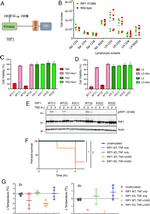Search Thermo Fisher Scientific
Invitrogen
CD3 Monoclonal Antibody (eBioG4.18 (G4.18)), Biotin, eBioscience™
Promotions
View available promotion(s)
Promo Code: P5877545 Don't miss out: buy 3, only pay for 2 From June 2-13 take advantage of our 3 for 2 promotion. Whether you are restocking essentials or trying something new, now is a great time to get more for your money!. Learn more
Promo Code: RPUZZ25 Stock up on essentials to piece your discovery together Until June 27, save up to $650 and get an exclusive lab-themed hidden-object puzzle. Learn more
FIGURE: 1 / 4
CD3 Antibody (13-0030-82) in Flow




Product Details
13-0030-82
Species Reactivity
Published species
Host/Isotype
Class
Type
Clone
Conjugate
Form
Concentration
Purification
Storage buffer
Contains
Storage conditions
Shipping conditions
RRID
Product Specific Information
Description: The eBioG4.18 monoclonal antibody recognizes the rat CD3 protein. CD3 is a critical component of the T-cell receptor (TCR) and is a marker of the T-cell lineage. CD3 is a complex of several subunits and, upon binding of a TCR ligand, participates in transduction of signals from the TCR to the nucleus which results in a variety of cellular responses including transcription of IL-2 and clonal expansion. in vitro, immobilized G4.18 monoclonal antibody has been demonstrated to activate T cells, while soluble G4.18 inhibited allogeneic mixed-lymphocyte proliferative responses and cell-mediated cytotoxicity to allogeneic target cells. in vivo, G4.18 was demonstrated to induce long-term specific tolerance to an organ allograft.
Applications Reported: This eBioG4.18 (G4.18) antibody has been reported for use in flow cytometric analysis, and immunohistochemical staining of frozen tissue sections.
Applications Tested: This eBioG4.18 (G4.18) antibody has been tested by flow cytometric analysis of rat splenocytes. This can be used at less than or equal to 0.25 µg per test. A test is defined as the amount (µg) of antibody that will stain a cell sample in a final volume of 100 µL. Cell number should be determined empirically but can range from 10^5 to 10^8 cells/test. This eBioG4.18 antibody has been tested by immunohistochemistry of frozen rat tissue and can be used at less than or equal to 10 µg/mL. It is recommended that the antibody be carefully titrated for optimal performance in the assay of interest.
Filtration: 0.2 µm post-manufacturing filtered.
Target Information
The CD3 complex, composed of gamma, delta, epsilon, and zeta subunits, is essential for the assembly, trafficking, and surface expression of the T cell receptor (TCR) complex. These subunits are structurally related members of the immunoglobulin superfamily and are encoded by closely linked genes on human chromosome 11. CD3 is expressed by thymocytes in a developmentally regulated manner and by all mature T cells, but not on B or NK cells. The CD3 subunits play a crucial role in transducing antigen-recognition signals into the cytoplasm of T cells. The cytoplasmic tails of CD3 subunits contain a double tyrosine-based motif that associates with cytoplasmic signal transduction molecules, mediating T cell activation through the TCR. Crosslinking of the TCR initiates intracellular biochemical pathways that result in cellular activation, proliferation, and potentially growth arrest and cell survival. CD3 is present on 68-82% of normal peripheral blood lymphocytes, 65-85% of thymocytes, and Purkinje cells in the cerebellum. Decreased percentages of T lymphocytes may be observed in some autoimmune diseases. Defects in the CD3 gene are associated with CD3 immunodeficiency, highlighting its importance in immune function and regulation.
For Research Use Only. Not for use in diagnostic procedures. Not for resale without express authorization.
Bioinformatics
Protein Aliases: CD247 antigen; CD3 antigen delta polypeptide; CD3 antigen, epsilon polypeptide; CD3 antigen, gamma polypeptide; CD3 antigen, zeta polypeptide; CD3 gamma-chain; CD3 molecule delta polypeptide; CD3 molecule, epsilon polypeptide; CD3 molecule, gamma polypeptide; CD3 TCR complex; CD3d; CD3g; FLJ18683; Leu-4; T cell antigen receptor complex epsilon subunit of T3; T-cell receptor CD3 subunit zeta; T-cell receptor CD3, subunit zeta; T-cell receptor T3 delta chain; T-cell receptor T3 gamma chain; T-cell surface glycoprotein CD3 delta chain; T-cell surface glycoprotein CD3 epsilon chain; T-cell surface glycoprotein CD3 gamma chain; T-cell surface glycoprotein CD3 zeta chain; T3/TCR complex
Gene Aliases: Cd3d; Cd3g; Cd3z; T3d; TCRzeta
UniProt ID: (Rat) P19377, (Rat) Q64159
Entrez Gene ID: (Rat) 25300, (Rat) 25710, (Rat) 315609, (Rat) 300678

Performance Guarantee
If an Invitrogen™ antibody doesn't perform as described on our website or datasheet,we'll replace the product at no cost to you, or provide you with a credit for a future purchase.*
Learn more
We're here to help
Get expert recommendations for common problems or connect directly with an on staff expert for technical assistance related to applications, equipment and general product use.
Contact tech support
